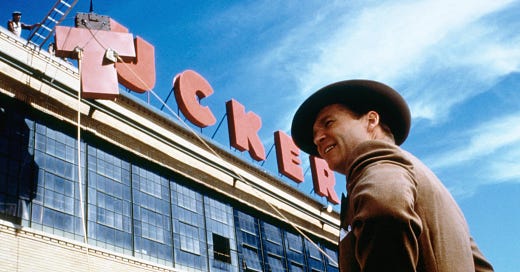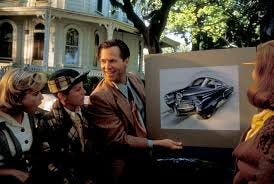First… how about a little story…
Once upon a time, a brilliant but eccentric engineer with a huge family and a talent for showmanship built a revolutionary car, one like nothing anyone had ever seen, one which quickly became a nationwide sensation. But because this inventor’s heterodox ideas threatened the status quo, as well as the bottom lines of entrenched power interests from Washington to Detroit to California, a complex and nefarious coalition of public and private entities conspired to destroy this disruptor both personally and professionally.
This is a true story, but it is not a story about Elon Musk.
The 80’s were good times for Hollywood. The movie business was making money hand-over-fist on the backs of an army of movie stars so incandescent, they didn’t even need last names… Arnold, Sly, Bruce, Mel, Eddie… There was so much money flying around, and the financial boom seemed so unstoppable that some of the more prominent dramatic directors of the period were allowed to make films critical of an economic system they saw as fundamentally corrupt… under the guise of popular mass-entertainment of course.
If it seems strange for an industry to criticize the American laissez faire Capitalist system right in the midst of the greatest period of economic growth since World War 2, consider this… all of the reputational benefits of this booming economy were accruing to a President loathed by many of the most powerful people living in the shadows of the Hollywood sign. A man Don Henley once described as a “tired old man that we elected King”, and for whom ploughshares were being beaten into swords on the high-speed railway to nuclear war with the Soviets.
Sure, times were good on the surface, but the rich were getting richer and not enough of that wealth was “trickling down”, American corporations were flexing their muscles in a dangerously de-regulatory environment, and it seemed as if all of official Washington was nestled comfortably in their pockets… to hear the Liberals tell the story of America as the 80’s rolled on towards the 90’s.
And so, while Arnold, Sly, Bruce, Mel and Eddie brought law, order, justice and well-ventilated bad guys to America on one side of the multi-plex, “elite” filmmakers like Oliver Stone, Brian De Palma, Mike Nichols and Francis Ford Coppola took the opportunity provided by weekends full of enthusiastic theater-goers to remind us of what they saw as the dangers of unfettered Capitalism and specifically the way it conspires to keep the common man down.
Which brings me to the actual subject of the story with which I opened this essay… Preston Tucker. And the cautionary tale which told the story of his life, on film, was Coppola’s “Tucker: The Man and His Dream.”
I had the idea for this essay long before I actually sat down to re-watch Coppola’s film, and even I was not prepared for all the ways in which the Preston Tucker story mirrors that of Elon Musk. For one thing, like Musk, Tucker was a showman who understood the immense power of a “meme.” Tucker launches his car line before any Tucker vehicles actually exist by planting a “fake news” story in a prominent magazine. The article goes “viral” and Tucker is flooded with letters from all over the country asking “where can I buy one of your amazing cars?”
Preston Tucker was also an impulsive prankster. OK, maybe he never carried a ceramic kitchen sink into his office as a symbol of what he planned to do with his new company, but he does trade a Packard for a dozen trained dalmations, telling his wife “you can’t walk away from a trade like that.”
Both men are relentless optimists who combine a sunny disposition and an irresistible sense of fun with a vicious anti-authoritarian streak and a steely determination to prove their detractors wrong. The best way to inspire men like Preston Tucker and Elon Musk to succeed is to tell them they can’t do something.
But Preston Tucker’s greatest sin, like Elon Musk’s, was that he embraced the wrong ideas, as defined by those who control the system… which is to say he tried to disrupt that system and pissed off all the wrong (right?) people in the process.
“Tucker The Man and His Dream”, like “Caddyshack”, “Animal House”, “Trading Places”, “Wall Street” and a million other classic Hollywood stories from the 80’s is not about rich versus poor. It’s about class. Preston Tucker’s real crime, like Al Czervick and Danny Noonan at Bushwood, the brothers and pledges of Delta Tau Chi, Winthorp and Billy Ray Valentine, and Bud Fox at Jackson Steinem, is that he tried to rise above his station and was destroyed by the powerful public and private interests who, in Hollywood’s view, enforce a rigid social heirarchy and control America in a way that is unfair and ultimately illegitimate.
And the thing is, they weren’t wrong. We cheer at the end of all these movies because, Preston Tucker excepted, the heroes of these movies defeat those corrupt entrenched interests and succeed beyond their wildest dreams.
And that’s America. Or it used to be.
The problem is that, somewhere along the way, Hollywood switched sides.
Elon Musk is everything those movies once celebrated about the great idea men of America, and yet there is no more hated individual in Hollywood right now than Elon Musk. All over town, executives are abandoning their Teslas and fleeing his free speech platform X for the sunnier partisan silos of Bluesky where censorship is not only allowed, but encouraged… which is a hell of a thing for an industry which came of age during the “Blacklist Era” to do.
And why? Because Musk defied them. He chose to take the side of the disruptors against the powerful entrenched interests… of which Hollywood is now a critical part.
Hollywood has become a defender of the system, rather than a critic of it. When Musk betrayed that system he betrayed them. And so they attacked, ultimately throwing in their lot with the same side which ultimately destroyed Preston Tucker… a truly nefarious partnership between government and corporate interests. For all the talk of Fascism flying around the corridors of Hollywood these days, they seem to have missed a critical classroom lesson somwhere along the way.
Would Francis Coppola, or any other “elite” American filmmaker ever dare to make a movie called “Musk: The Man and His Dream”? Would any traditional Hollywood studio finance it?
To ask the question, is to answer it.
What a change we’ve seen since 1988. In the Hollywood of 2024, men and their dreams are all well and good, just as long as they stay in their place.
If you enjoyed this essay and would like to support the work we do here at The Continental Congress, please consider becoming a paid subscriber. I love writing these, but it does take time and a lot of sweat equity. Thank you, so much, for your time and your patronage!






I write about automotive history. Tucker was effectively put out of business by the government, not by a conspiracy of the Detroit automakers as Coppola's movie implies. In that sense, the movie is as anti-business as is typical of Hollywood.
To begin with, there are ample reasons why Preston Tucker's car company failed without getting into conspiracies. He was badly undercapitalized, he did some sketchy fund raising and dealer franchising, there were technical and quality control issues with the early production cars, and in the immediate postwar period the government was still controlling commodities under the War Production board, making it hard for startups to even get steel and aluminum. In order to get engines he had to buy the remnants of the Franklin car company, and then convert the Franklin air-cooled flat six into a water cooled engine. As much as people say the Tucker car was ahead of its time, much of those features were technological dead ends. There is exactly one production car made today with a rear mounted engine. The Tucker used rubber springs that would break down over time (I know the guy who has restored a couple of Tuckers and makes reproduction springs). The choice of transmissions was either a New Old Stock Cord preselector manual likely made in the 1930s (when E.L. Cord closed his car companies, there was a factory full of parts in Auburn), or a single speed Tuckermatic eight years after Cadillac and Oldsmobile had the three speed Hydramatic. No modern transmissions are related to the Tuckermatic design. Tucker's "safety cell" literally meant front seat passenger dove under the dashboard in the event of a crash. Modern cars use laminated safety glass, not pop-out windshields.
Did the big domestic automakers conspire against Tucker? In all the years since 1948, nobody's been able to come up with any concrete evidence of a conspiracy. If GM, Ford, and Chrysler were going to gang up on an automotive startup, that would have been Kaiser-Frazer. Preston Tucker was a promoter without a high school diploma. He'd worked with Henry Miller for Henry Ford on an ill fated front wheel drive Indy racer and during the war designed a rotating gun turret used on American planes and boats, as well as an armored combat vehicle that never saw production.
Henry Kaiser, on the other hand, was one of America's leading industrialists. His shipyards introduced mass production method to building Liberty ships during the war. Kaiser-Frazer failed too, but nobody says it was a conspiracy. Even established independents like Hudson, Nash, Studebaker and Packard had a hard time surviving. Nash and Hudson merged to form American Motors, which lasted as long as the late 1980s but that's gone now too. Studebaker and Packard merged, but it was too late to save them and they were gone by 1966.
Tucker was an early example how regulators and federal prosecutors make the process the punishment. Tucker was acquitted of all charges of stock fraud and conspiracy but by then his reputation was tarnished and he had no hope of raising funds to continue production.
Well said, MF'r ;)